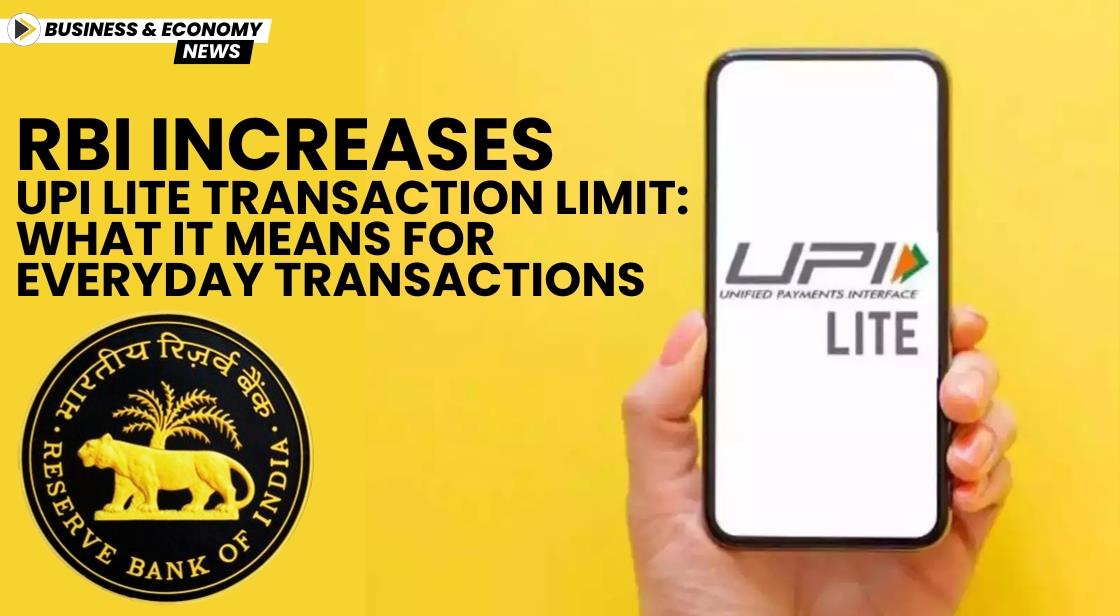RBI Increases UPI Lite Transaction Limit:: What It Means for Everyday Transactions

News Synopsis
The Reserve Bank of India (RBI) has announced an increase in the UPI Lite transaction limit to ₹1,000 per transaction and the wallet limit to ₹5,000. This move is expected to simplify digital payment solutions for millions of users across India, enhancing convenience and promoting financial inclusion.
Earlier, these limits were capped at ₹500 and ₹2,000, respectively. Additionally, wallet recharges can only be performed online with Additional Factor Authentication (AFA), ensuring secure transactions.
What is UPI Lite?
Introduced in January 2022 and updated in August 2023, UPI Lite is a framework designed to facilitate small-value digital payments. It allows users to perform offline transactions, making it possible to execute payments without internet access.
Key Features of UPI Lite:
-
Offline Transactions: Payments can be made without internet connectivity, ensuring instant and reliable transactions.
-
Ease of Use: It eliminates the need for entering a UPI PIN for every transaction.
-
Clutter-Free Passbooks: Transactions are not recorded in bank passbooks, offering users a cleaner transaction history.
-
Everyday Applications: Suitable for daily purchases such as groceries, medicines, dining, and fuel payments.
These features make UPI Lite a user-friendly solution for small-value transactions.
How Will Customers Benefit?
Convenience for Daily Payments
The increased transaction limit of ₹1,000 enables users to handle frequent expenses like shopping or commuting without needing frequent wallet recharges.
Enhanced Transaction Volume
With the wallet cap increased to ₹5,000, users can now conduct more transactions without frequent reloading.
Financial Inclusion
The enhanced limits promote digital payment adoption in rural and semi-urban areas, bringing underserved communities into the digital economy.
Security and Efficiency
Online wallet recharges secured by AFA reduce reliance on cash and ensure quicker, safer payments.
According to Dilip Modi, Founder & CEO of Spice Money, this initiative will expand the reach of UPI to newer user segments, encouraging small-scale merchants and consumers to adopt digital payments and reduce cash dependency. “This step reflects India's commitment to leveraging technology for financial inclusion,” Modi added.
UPI’s Expanding Ecosystem
UPI’s Growing Popularity in India
In November 2024, UPI processed 15.48 billion transactions worth ₹21.55 lakh crore, showcasing a 38% year-on-year increase in volume and a 24% rise in value.
Global Expansion of UPI
India’s UPI is making a mark internationally:
-
Operational in countries like Sri Lanka, Mauritius, France, the UAE, Singapore, Bhutan, and Nepal.
-
NPCI International is in discussions with over 20 countries across Africa and South America to implement similar systems.
UPI’s global reach underscores its scalability and adaptability in diverse payment ecosystems.
What is NPCI?
National Payments Corporation of India (NPCI)
NPCI is an Indian public sector company that operates retail payments and settlement systems in India. It was founded by the Reserve Bank of India (RBI) and the Indian Banks' Association (IBA) to create a robust and secure payment infrastructure in India.
Key Initiatives and Services:
-
UPI (Unified Payments Interface): A mobile-based payment system that allows users to transfer funds between bank accounts instantly.
-
RuPay: A domestic card payment scheme that offers debit and credit cards.
-
IMPS (Immediate Payment Service): A real-time fund transfer system that enables instant transfers between bank accounts.
-
BHIM UPI: A mobile app that allows users to make UPI payments directly from their smartphones.
-
Bharat Bill Payment System (BBPS): A system that enables customers to pay bills for various services like electricity, gas, water, and insurance.
-
National Automated Clearing House (NACH): A centralized automated clearing house for electronic clearing of transactions.
NPCI has played a significant role in the digital transformation of India's payment landscape, making it easier and more convenient for people to make payments.Its innovative products and services have contributed to the growth of the Indian economy and financial inclusion.
Conclusion
The RBI’s increase in UPI Lite transaction limits is a transformative step that will simplify payments for everyday users and promote the adoption of digital financial services in underserved areas. With its growing acceptance both domestically and globally, UPI is becoming a cornerstone of India’s financial technology landscape.
You May Like









